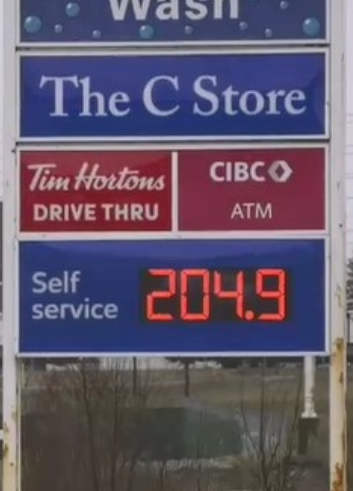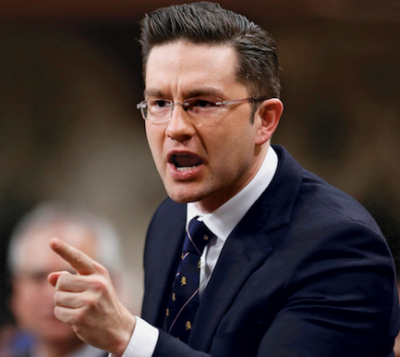 By Ray Rivers
By Ray Rivers
January 22nd, 2024
BURLINGTON, ON
If you are a taxpayer in Ontario and have checked your bank account recently you should see a deposit. That is your quarterly carbon tax rebate. It may or not be shown as CAIP (climate action incentive payment) depending on the banking institution. But it is tax-free money from your federal government and intended to offset the so called federal carbon tax.
 The federal government argues that it’s not properly a tax since, as a kind of revolving fund, the carbon levy is revenue neutral. Everything collected is returned to tax filers less some small amount for administration. The point of the tax is to make the costs of fossil fuels increasingly more costly so Canadians will switch to non-carbon alternative energy sources.
The federal government argues that it’s not properly a tax since, as a kind of revolving fund, the carbon levy is revenue neutral. Everything collected is returned to tax filers less some small amount for administration. The point of the tax is to make the costs of fossil fuels increasingly more costly so Canadians will switch to non-carbon alternative energy sources.
Though the carbon levy was originally introduced as a climate change policy, it has in fact also turned out to be a good income equity measure. The carbon tax rebate, which, in Ontario is now approaching one thousand dollars a family annually, makes Mr. Trudeau look like Robin Hood.
According to a 2023 Statistics Canada report, 94 per cent of households with incomes below $50,000 received carbon tax rebates that exceeded their carbon-tax costs in 2023. About half of these households netted out between $20 and $40 per month.
Increasing the cost of fossil fuels is a step in the right direction towards rectifying the historical distortion in resource pricing. The federal and provincial governments have been subsidizing the petroleum sector with the handouts of tax payers’ money for at least half a century, and that hides the true cost of your gasoline and heating fuel.
Ontario, for example, is now spending millions of our tax payer dollars to cap its legacy oil wells which continue to leak methane, a powerful greenhouse gas. The landscape of Alberta and Saskatchewan is dotted with old unused orphan wells. Some 170,000 or almost 40% of all the wells are in Alberta need to be capped. And it has been left up to governments to clean up this mess.
Alberta was the first jurisdiction in the country to impose a carbon tax of sorts on its industries, back in March 2007. Quebec followed with a broader consumer tax and B.C. brought in an even broader one, covering roughly 70% of provincial greenhouse gas emissions. Quebec and Ontario then had implemented a cap-and-trade emissions program which exempted them from the federal carbon tax, but Doug Ford axed Ontario’s along with all new renewable energy projects as one of his government’s first acts.
The Canadian federal carbon tax was implemented in 2019. It is a progressive tax, similar to the programs in Quebec and B.C.,and increases each year in hopes that the consumers get the message. This year it’ll be 17 cents per litre of gasoline and 15 cents per cubic metre of natural gas. That works out to roughly $80 per tonne of CO2. But, the tax will more than double by 2030.
 Mr. Trudeau dealt the credibility of carbon pricing a blow when his government decided to help homeowners by removing the carbon tax from heating oil. This lapse in policy stinks of partisan politics. Moreover, that has given Mr. Poilievre ammunition in his quest to completely axe the carbon tax should he win the next election. And given the polls that is exactly what will happen in 2025 if not sooner.
Mr. Trudeau dealt the credibility of carbon pricing a blow when his government decided to help homeowners by removing the carbon tax from heating oil. This lapse in policy stinks of partisan politics. Moreover, that has given Mr. Poilievre ammunition in his quest to completely axe the carbon tax should he win the next election. And given the polls that is exactly what will happen in 2025 if not sooner.

Pierre Poilievre hammering the Trudeau government in the House of Commons.
Most folks I’ve asked recently have not noticed receiving their clean air incentive (CAIP) in their bank accounts, even though they likely have. And that ignorance, may be why Mr. Poilievre is gaining so much traction with his misinformation campaign about the carbon tax.
Perhaps the federal government needs to reconsider using less expensive direct deposit for the CAIP. After all, nothing communicates the truth to taxpayers better than a government cheque in their hands.
 Ray Rivers, a Gazette Contributing Editor, writes regularly applying his more than 25 years as a federal bureaucrat to his thinking. Rivers was once a candidate for provincial office in Burlington. He was the founder of the Burlington citizen committee on sustainability at a time when climate warming was a hotly debated subject. Ray has a post graduate degree in economics that he earned at the University of Ottawa. Tweet @rayzrivers
Ray Rivers, a Gazette Contributing Editor, writes regularly applying his more than 25 years as a federal bureaucrat to his thinking. Rivers was once a candidate for provincial office in Burlington. He was the founder of the Burlington citizen committee on sustainability at a time when climate warming was a hotly debated subject. Ray has a post graduate degree in economics that he earned at the University of Ottawa. Tweet @rayzrivers
Background links”
Climate Action Pricing – Carbon Rebate – Lower Incomers – Industry Legacy –





















Those in the Maga dream-world believe we live in a magical land where Covid kills nobody, petrochemicals cause no pollution, no one is responsible for climate deterioration, and everybody can just flit through a life of rainbows on winged, pink ponies. The rest of us, somehow, must deal with them, work an economy, juggle a democracy, barter some peace, and somehow make a better world for our children’s future. Dreaming, fantasizing and idle boasting alone will only result in a nightmare.
The envelope system. The Laurentian elites should know this all to well.
Actually, no in a sense. As a retired person I pay taxes on installments, it did not going into my bank account but I was notified it was applied to my 2023 installments.
We all know this is not a climate plan, its a tax plan, as its failed on the GHG reduction objective. We also get back less than we pay as documented by the PBO, and it drives inflation.
Nothing says the “one finger solute” more than a bill board I saw on Canada Day 2023 of our MP Karina Gould wishing everyone a great summer, on the same day the second carbon tax was issues through the Clean Fuel Standard – you could not make this stuff up.
Well that’s the reason I couldn’t find mine, I’m the same as you except I now pay my taxes annually as I now earn very little income; I really knew nothing about the refunds until I read this piece, I never look at my bank account and all my bills are direct debit, it took awhile to come up with numbers, so if my Wife and I got the $181.00 somehow, it looks like we spent just over $200 in carbon taxes plus Hst between us for the same period. As an aside, I’t wouldn’t matter if trudeau gave me free use of his limousine for a year and a cottage on Harrington lake; my vote will be for the regular working families that are struggling because of this current governments disdain for ordinary Canadians.
I just heard back from the owner of one of the companies I used to own which serviced petrochemical and manufacturing facilities, he tells me that the service companies are now applying fuel charges to site visit invoices as a separate line item, so this means the ever higher fuel charges are being passed down to the consumer in real time. Companies being asked by government to give the consumer a break is as pathetic as asking someone else to feed your kids.
The idea of creating media excitement around the carbon tax rebate, would be the same as getting all excited about getting a tax refund, they are giving you your own money back.The good news is it will all be over soon, once again the evolutionary cycle of life will deflate the tyranny of the present. (I think I read that somewhere apologies to whomever wrote it)
Trudeau will be gone soon along with this scam.
Yes, I received a cheque in the mail.
In response to the outcry in eastern Canada, in October of 2023 the Liberal government provided home heating relief to some but not all Canadians.
I live in a Leeds building in Ontario that has a Geothermal system that also requires the use of natural gas to augment heating, mostly during the shoulder seasons.
Depending on the weather our gas consumption can range between 89,000 and 203,000 cubic metres (M3). In 2018 the cost of gas was .1319 cents per M3. There was no carbon tax in 2018. In 2023 gas cost .1536 per M3 plus an additional carbon tax of .1239 cents per M3. In a bad year the residents of our building will have to dig $25,186 deeper to offset the carbon tax to heat their units.
“The PBO is clear: the carbon tax costs families hundreds of dollars more every year than the rebates they get back,” said Franco Terrazzano, Federal Director of the CTF. “The PBO shows politicians are using magic math to sell their carbon tax.”
As to home heating support, some areas of the country are treated differently by our federal government.
Mine came on Jan 15th but just shown as “Pre-Authorized Credit CANADA” with not further explanation. Accepted without hesitation. Did not question ‘why’ or recognize it as from this program. A missed opportunity to promote this program.
Nice to read a commentary that presents facts so clearly, Ray. I strongly suggested a visible cheque would at inception transmit the rebate message (and dollars). The cheque I receive in the mail each quarter has the tiniest type I can imagine on the top left corner. It needs a MUCH BIGGER font, Mr. Trudeau! Making switching out our fossil vehicles for fuel cell and/or battery electric vehicles easier is also an important complementary policy. It is gratifying to see a new market-based progressive EV mandate regulation come into law recently to nudge dealers and manufacturers into putting EVs on their lots so people can try them and buy them. The one thing missing is a Car Heaven type program that the Clean Air Foundation (now Scout Environmental) implemented with great success and expanded as Retire Your Ride with federal financial support. These took 260,000 polluting cars off Canadian roads. It’s time to do it again! The more we can switch to low pollution or no polluting alternatives, the more demand for oil will fade. When demand departs, the oil stays in the ground – a fitting resting place for the remains of our ancestors.
Wow! just clicked on your highlighted name.
What is that, about 15,000 air miles? Just your portion alone would be 12’000 lbs of Co2? Good grief man, do you do that every year? Or am not seeing something ?
Yes, Ray, I got my rebate of $122 and guess what? The Trudeau Carbon Tax + HST (on the carbon tax) ate up the entire amount in my Enbridge bills for November, December, and January. And remember, as should all Burlington voters, that Karina Gould, the Liberal MP for Burlington, voted against pausing the carbon tax on home heating. When I count the DIRECT carbon taxes that I pay on gasoline and home heating PLUS the INDIRECT carbon taxes I pay in the form of higher prices, I’m out at least $600 per year on this tax scam.